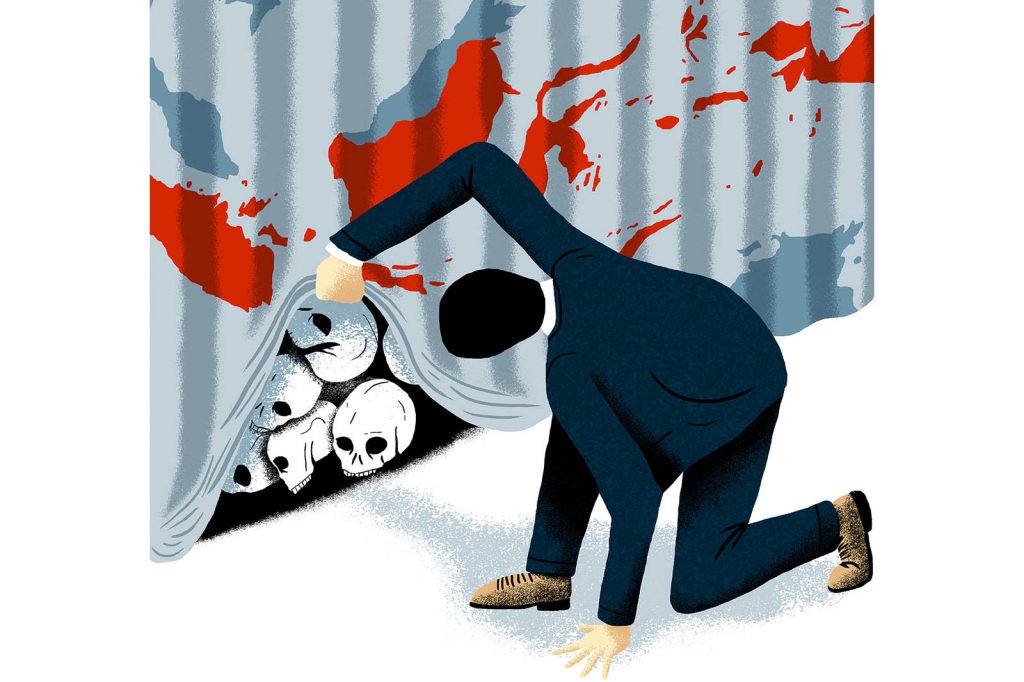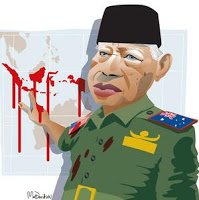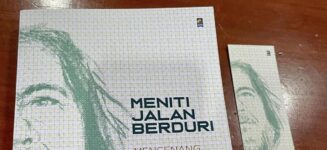Power accumulates in many ways. In the Javanese view, however, power is concrete and constant, argued Ben Anderson, an old hand in Indonesian studies, years ago. But, what if a (Javanese) man, once the most powerful in this country, having lost his formal authority for almost a decade, doesn’t totally lose power and influence? Soeharto has a so-called “liminal” problem.
Suharto, Indonesia’s second president and former dictator, has uniquely suffered for too long. Since July 1999, just a year after he was forced from office, he has gone back and forth to the hospital. Time and again he was released, a bit healthier than before, only to enter the hospital again some time later. This pattern has continued for almost a decade. In total, he has been hospitalised at least 14 times as a result of bad health and old age.
Medical aspects aside, this process raises a question of transition, both political and cultural.
For, like it or not, Suharto is a phenomenon. Each time he was brought to the hospital, a growing number of (former) state dignitaries who served under him paid him a visit and homage. And each time he’s thus back in the headlines, his opponents remind the public of his alleged criminal past.

Among his supporters, there has been a sort of state ritual, albeit rather informal, in the making. For, to pay a visit is to honour the man being visited, but it’s also a demonstration of the visitors’ loyalty and allegiance; possibly with some interests projected on his family business. They carefully conveyed public messages of empathy, forgiveness, even proposals to the effect of dropping all legal charges against him.
Over time, it might be expected that both the hospital-visit ritual by the supporters and the debate over Suharto’s legacy, alleged corruption and crimes among his opponents, may become routine and loses relevance. Wrong. The visit ritual and the debate has only intensified as Suharto’s health has gotten worse. Both sides have to get used to it, and silently expect that his final day will soon come.
While Suharto has definitely lost his status of most powerful, leaving one stage, he has not yet entered a new one. Such a station-in-between carries characteristics of an earlier stage without, however, acquiring new ones. Pioneering anthropologist Victor Turner (1967) calls this a liminal phase. It’s a critical stage in any human society; hence, its significant as part of society’s rite of passages.
An obvious example from our society is the circumcision of a Muslim boy. Once circumcised, the boy is no longer a stupid child, but is ready to reach the status of a man (akil baliq), or, in Javanese terms, ready to become civilised. In reality, though, he is neither the yesterday boy nor a new man.
To simplify: similarly, Suharto is no longer what he used to be, but, thanks to the visit ritual, he is still able to show some power and influence; yet, at the same time, now at 86, he is about to enter a final stage where he will be without power at all.
Suharto, of course, has always been aware of his past privilege (abuse, that is) of being the most powerful man, so he too must have recognized how his power accumulated during his good old days. This is the way we understand power in “western”, rational sense.
Viewed in the Javanese way, as Suharto would have it, power, being something concrete, is always clearly marked by concrete acts and events; and, being constant, it is always a zero sum; ie you get more at the cost of your counterparts – or subjects, for that matter — getting less; never a win-win, but always win and lose.
The ritual of hospital visits by (former) state dignitaries are concrete events which clearly illustrate this relationship that goes for Suharto winning more and his former subjects getting less — in terms of political status and image, that is. The ambiguity of Soeharto’s liminal status means that whatever “power” he possesses is no longer relevant even for him, and that the ritual of his loyal and humble (former) dignitaries only serves their own interests.
Since Suharto’s rule is viewed as an antithesis of all virtues of democracy, the homage ritual by his supporters cannot be seen as serving Indonesia’s new democracy and its people. Suharto himself never acted similarly: he only visited Gen. AH Nasution’s and president Sukarno’s families after the two men died.
On balance, while the hospital visit ritual by Suharto loyalists does nothing to educate the nation on democracy, the debate and discourse over Suharto’s legacy are clearly more useful – certainly as many of his critics would remind the public of him being politically responsible for the 1965 mass killings, East Timor genocide, Aceh bloodbath and massive corruption.



